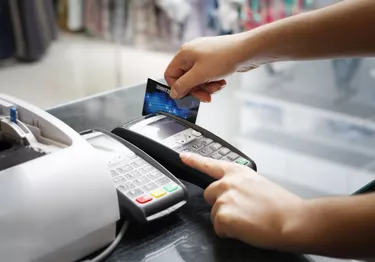
Whether you're a merchant or a customer, trying to reverse charges on a debit card is a hassle. There aren't many reasons why someone might want to reverse the charge on a debit card, but there are three primary ways it can be done and the process can take as little as twenty four hours or as long as three to five days. To understand the three possible way to reverse a debit card purchase, you'll need to understand how debit card purchases are different from credit card purchases.
How Do Debit Card Purchases Work?
Video of the Day
A debit card is essentially a direct link to a checking or savings account. When you use a debit card to make a purchase, the amount is frozen in the customer's account and debited to the merchant's account. The Get Out of Debt Hub explains that there is a brief period in which the customer does not have access to this amount of money, nor can the merchant truly count the money as income until the transfer has been completed. If the transaction is disputed within this time, usually before the end of the merchant's operating hours, the funds will never complete the transfer to the merchant's account and will be unfrozen in the customer's account.
Video of the Day
This is called a "reversal," and is the fastest and least complicated way to reverse a debit charge, since at this point the funds have not yet actually changed hands. Effectively, the transaction has been canceled as if it never happened. If the merchant ends their operating day and posts their credit and debit transactions, things get more complicated, and there are only two ways to reverse the debit charge; a "refund," or a "chargeback."
Refund vs. Chargeback
Refunds are fairly straightforward on the face of it, but carry extra financial burdens for the merchant. In the event of a refund, the customer has contacted the merchant and the merchant has agreed to forego the cost of the product or service and to transfer an amount of money to the customer equal to the original transaction. This is different from "returning" the customer's money, in that the merchant will also cover the transaction fees of both the original purchase and the refund as well as taking a loss on the original transaction.
A chargeback occurs when the customer contacts their banking institution to dispute a transaction instead of contacting the merchant, or if the merchant refuses to refund the amount. Their institution will request the return of the funds or a legally defensible reason as to why not. This is bad for the merchant in a number of ways, as enumerated by Tidal Commerce, including being flagged by card institutions as problematic. If a merchant faces enough chargebacks, they might be entirely denied access to the card networks and be unable to process either credit or debit card transactions.
Handling Reverse Charges on Debit Cards
As a customer, your first step should be to contact the merchant as soon as possible if you have changed your mind or made a mistake. Most merchants will do their best to accommodate you with a reasonable reversal or refund, for the reasons stated above, and the reversal or refund will be processed more quickly. If you do end up going forward with a chargeback, your banking institution will submit the request in writing and must wait several days for a response from the merchant.
As a merchant, you can protect yourself from fraud and be more able to dispute chargebacks by undertaking some of the some steps suggested by Chargebacks911 to retain clear, scrupulous records and identifiable billing practices. By assigning a unique tracking ID to each transaction, as well as a detailed description of what that transaction entailed, you can more easily find a record of preauthorization and agreement to your terms of services. This will allow you to dispute chargebacks more easily, if it comes to that.